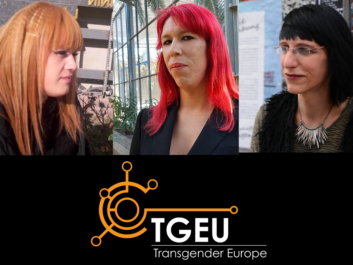Listen to the Voices of Sex Workers!

Transgender Europe calls for the decriminalisation of sex work in Europe
On this International Day to End Violence against Sex Workers (December 17th), Transgender Europe (TGEU) calls for the full decriminalisation of sex work.
Violence against sex workers is widespread. It is estimated that, globally, sex workers have a 45-75% likelihood of experiencing workplace violence at some point in their life, mainly due to high levels of stigma and criminalisation of sex work.1
In many countries, trans sex workers face severe abuse from law enforcement authorities, constant police surveillance, forced STI and HIV testing during police raids, and systematic exclusion from healthcare and social services. Undocumented migrant trans sex workers are further affected by prohibitive immigration policies and anti-human trafficking measures that constantly undermine their safety, forcing them to work in isolation thus increasing their susceptibility to exploitation. These measures frequently result in deportation.2
From 2008 to 2016, of the reported trans people murdered in Europe whose occupation was known, 86% were sex workers – more than two thirds of whom were also migrants.3
2016 has seen a significant reversal of sex workers’ rights in Europe. In France, after years of debates and protests from sex worker groups, harm reduction and human rights NGOs, the criminalisation of clients (those who purchase sex) has been introduced. Similarly, Serbia has introduced amendments to its public order law to criminalise clients as well as increasing the punishment for sex workers, who can now be imprisoned for up to 60 days. These attempts to introduce the ‘Swedish model’ (in which the purchase of sexual services is illegal but not the sale) – often backed by feminist and women’s rights organisations – have seen negative developments even in countries where sex work has previously been legal. In Germany, a new law on sex work will come into force in 2017 which introduces punitive measures for sex workers, forcing them to register and undergo regular counselling with the intent of preventing human trafficking.
“Trans sex workers have mobilised – often from the margins – against these trends for decades. TGEU already showed its support for sex worker rights by adopting its Decriminalisation Policy this year. But we won’t stop here. We will continue to monitor human rights violations against trans sex workers, advocate for their rights on the European level and involve them in our work as experts, not only on issues concerning sex work, but also on issues of migration, social marginalisation, and state-sponsored violence. We also call on European LGBT, women’s rights, feminist, migrant and other human rights organisations to support the demands of the sex worker movement and to speak out for the full decriminalisation of sex work.”
Executive Director of Transgender Europe, Julia Ehrt
For more information contact:
Boglarka Fedorko, Project Manager: boglarka@tgeu.org
Glossary & Definitions
Transgender Europe is a European human rights NGO working for the human rights and equality of all trans people. More Information: www.tgeu.org
Transgender or Trans is an umbrella term for people whose gender identity or expression differs from the sex assigned to them at birth. For more information, and a glossary see: http://tgeu.org/journalist-guide/ and http://tgeu.org/glossary/
Full decriminalisation refers to an absence of any laws and forms of legal oppression that prohibit sex work itself or associated activities like facilitation of sex work and the purchase of sexual services.
Sex work refers to adult sex workers of all genders who are engaging in commercial sex that they have consented to (that is, choosing voluntarily), making it distinct from trafficking.
Notes
TGEU’s Sex Work Policy: http://tgeu.org/sex-work-policy/
Listen to the Voices of Sex Workers! Emy, Oja, and Sabrina call on the trans communities to listen to the voices of trans sex workers and to organise in solidarity against violence:
References
- Deeringa, K. et al., 2014, A Systematic Review of the Correlates of Violence Against Sex Workers, American Journal of Public Health, 104(5): 42–54, https://www.ncbi.nlm.nih.gov/pubmed/24625169 ↩︎
- http://www.sexworkeurope.org/sites/default/files/resource-pdfs/icrse_briefing_paper_migrants_rights_november2016.pdf ↩︎
- http://transrespect.org/en/trans-murder-monitoring/tmm-resources/ ↩︎